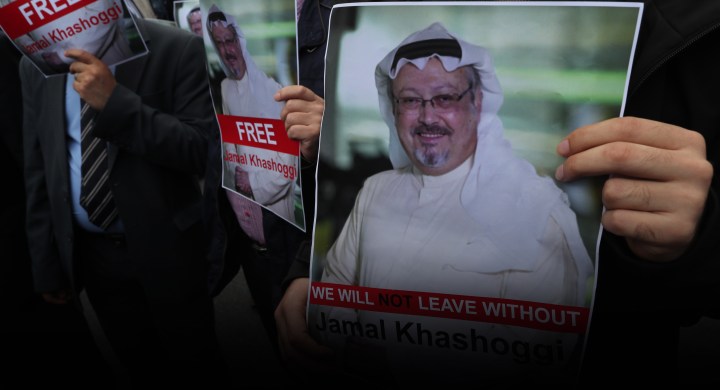2018 International Person of the Year
Jamal Khashoggi wielded a mighty pen, and paid the ultimate price

As we do every year, Daily Maverick looks around the globe for an appropriate and fitting person to honour as our International Person of the Year. This year’s choice should not surprise anyone.
It is that time of year again when we sum up, look back, and try to define the person who most strongly and indelibly changed our world. For good or ill, of course. 2018 has been one helluva year, and there are many possible choices. In fact, to get the widest possible range of choices, the writer asked various people face-to-face, as well as through social media channels, and he was offered some very interesting choices for consideration.
Demonstrating a real appreciation for human possibility and humanitarian optimism, some people have suggested that, collectively, the dozens and dozens of rescue experts from around the world who spontaneously joined together to rescue the Thai youth football team that had become trapped in a maze of caves, and threatened by a rising tide of monsoon rain run-off, deserved consideration.
All of these underwater rescue veterans, spelunkers, field logistics experts, and emergency medical personnel from country after country – civilian and military – came together and quickly turned themselves into a cohesive team that brought every single one of those children up to the surface, essentially unharmed, after days and days of breathless, globally televised reality show-style broadcasts that had people everywhere on the edge of their respective chairs. Inspiring, yes.
In that same vein, in the face of vast, unprecedented wildfires across California, others have recommended a sustained round of applause and bragging rights as persons of the year for the hundreds of firemen and women from across the US, the flame jumpers and pilots, the convicts who volunteered to help, the US Forest Service field teams, the civilians who just wanted to help in containing and then extinguishing those massive fires. (And they managed to do the job without raking up all the leaves, as Donald Trump would have done it.) Once again, these, too, were brave people who joined together in the best traditions of volunteerism, civic co-operation and just plain dangerous hard work to combat a terrible natural disaster. Once again, an inspiring choice to consider.
There is also another collective – the hundreds of scientists worldwide who, despite the foot-dragging of some political leaders who apparently believe in phlogiston, perpetual motion, and the spontaneous transmutation of lead into gold – worthy of consideration. They are trying hard to reverse course before heedless human actions drive us all onto the rocks of global warming and climate change. Yet again, another worthy choice of people who have come together, this time for the common good of us all. Well worth considering as well.
Or, what about the scientists and engineers in various nations who have successfully designed, tested, and launched craft to land on the Martian surface and then to drill into it, or onto the side of Earth’s Moon we never see from our planet, on to asteroids and comets, or even, most extraordinarily, to the outer atmosphere of the Sun. The exploratory impulse is alive and well. And these explorers go far, even as they sit at their computer desks and lab benches. They inspire us all.
Then, of course, there are those usual suspects – people like German Chancellor Angela Merkel, British Prime Minister Theresa May, French President Emmanuel Macron, Russian leader Vladimir Putin, Chinese President Xi Jinping, and Donald Trump, who have led their respective nations well – or badly – in 2018. Or even, perhaps, consider Binyamin Netanyahu in tandem with the leaders of Hezbollah, those wonderful people who run Facebook, or even China’s uber IT genius, Jack Ma. Maybe, or maybe not, the lot of them.
Our vote ultimately must go to the late Jamal Khashoggi. He was a sometime columnist with The Washington Post who, with some untimely assistance from Saudi Crown Prince Mohammed bin Salman, has fundamentally upended the Near East strategic equation and balance – and the circumstances of leaders in many of the countries in that region and beyond – and almost certainly for years to come.
To review, Khashoggi was a respected journalist who, over time, became less and less enamoured with the Saudi royal family’s grip on their country’s fortunes, and most especially the increasingly imperious and impetuous direction from its young crown prince. Khashoggi moved to suburban Washington (Northern Virginia to be exact) and became one of the highly respected members of The Washington Post global commentator stable. His last column, published just after his death, was a fervent plea for greater free expression in the Arab world. It read in part:
“I was recently online looking at the 2018 ‘Freedom in the World’ report published by Freedom House and came to a grave realisation. There is only one country in the Arab world that has been classified as ‘free’. That nation is Tunisia. Jordan, Morocco and Kuwait come second, with a classification of ‘partly free’. The rest of the countries in the Arab world are classified as ‘not free’.
“As a result, Arabs living in these countries are either uninformed or misinformed. They are unable to adequately address, much less publicly discuss, matters that affect the region and their day-to-day lives. A state-run narrative dominates the public psyche, and while many do not believe it, a large majority of the population falls victim to this false narrative. Sadly, this situation is unlikely to change…
“… Arab governments have been given free rein to continue silencing the media at an increasing rate. There was a time when journalists believed the Internet would liberate information from the censorship and control associated with print media. But these governments, whose very existence relies on the control of information, have aggressively blocked the Internet. They have also arrested local reporters and pressured advertisers to harm the revenue of specific publications…
“My publication, The Post, has taken the initiative to translate many of my pieces and publish them in Arabic. For that, I am grateful. Arabs need to read in their own language so they can understand and discuss the various aspects and complications of democracy in the United States and the West. If an Egyptian reads an article exposing the actual cost of a construction project in Washington, then he or she would be able to better understand the implications of similar projects in his or her community.
“The Arab world needs a modern version of the old transnational media so citizens can be informed about global events. More important, we need to provide a platform for Arab voices. We suffer from poverty, mismanagement and poor education. Through the creation of an independent international forum, isolated from the influence of nationalist governments spreading hate through propaganda, ordinary people in the Arab world would be able to address the structural problems their societies face.”
Thus were his final provocative words to the world, save for his screams and cries in his death agonies, as recorded by foreign intelligence agencies.
Throughout history, many, many people, journalists and others, have died needlessly at the hands of authoritarian regimes. Despite their deaths, after brief flurries of attention, anger, or pious hand-wringing, however, the circumstances of most everyone else have continued on largely as before, once the angry finger-wagging and tongue-clucking subsided. But the after-effects of Khashoggi’s agonies have been very different, reverberating and re-echoing across the global landscape.
The astonishing brutality of this extraordinary violation of centuries of diplomatic norms, in which a death squad captured a man who had entered a consulate for documents related to his impending marriage, and who was then murdered and dismembered, has appalled us all; especially once this ghastly deed became known, no thanks to the Saudis who had dissembled about it for days. Instead, outrage has grown. But as the full extent of Saudi government and royal family complicity, and their duplicity – as well as the intertwining of Saudi and American senior officials on both policy terms and personally, has come into sharper focus, most especially the ties between Donald Trump’s son-in-law and senior adviser Jared Kushner and the Saudi crown prince – the effects of Khashoggi’s death have become a growing cascade of events.
Khashoggi’s death has triggered an unprecedented, growing repudiation of the US’s historically unlimited support of Saudi Arabia by the US Senate over Saudi intervention in the brutal Yemeni civil war, as well as other expressions of disapproval over Saudi efforts to isolate Qatar in the region. It has also triggered a global pullback from support for the crown prince’s efforts to push his dream of Saudi 2030 investment goals and a thoroughgoing economic reformation of the kingdom. In the wake of revulsion over Khashoggi’s death, global participation in the kingdom’s gigantic investment conference also became a deep letdown.
But the real damage has come in what had been those deep but rather behind-the-scenes MBS-Kushner joint efforts to align Saudi, Israeli and American interests and actions vis-a-vis Iran, Hezbollah, Syria, and Russia, in order to reshape the Middle East. Khashoggi’s death has now encouraged a wide and growing range of Americans to question the basis of US-Saudi ties, despite the Trump administration’s increasingly hectic efforts to claim that hundreds of billions in US arms sales hang in the balance if those bilateral ties become frayed by even a micron, as well as the president’s regular touting of Saudi Arabia’s presumed hegemonic role with OPEC oil pricing in order to keep petroleum prices down.
It is quite plausible that little of all this would have unravelled the way it has, without the brutal murder of Jamal Kashoggi. And in his death, those in the Arab world who would again push for greater free expression and governmental transparency (after all the disappointments and failures of the Arab Spring) have now gained a martyr and a potent symbol, in spite of those in power who would much rather reach back to the obscurantism of the Middle Ages as their model for the future.
For all this, and for the power of his writing as well, Jamal Khashoggi is our 2019 International Person of The Year. DM



















 Become an Insider
Become an Insider